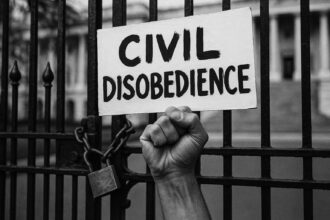Iris Robinson’s meteoric rise and subsequent fall from grace exposed deep challenges within the DUP, with her legacy still influencing the party’s standing amid shifting Northern Ireland politics, as revisited by a new BBC documentary.
The political saga surrounding Iris Robinson is one of the most striking narratives in recent Northern Irish history, highlighting both the complexities of personal ambition and the inherent vulnerabilities of political life. As a prominent figure in the Democratic Unionist Party (DUP), her trajectory saw a remarkable ascent to power followed by a dramatic fall from grace that continues to resonate in the political landscape today.
Iris Robinson’s political career began in earnest in the late 1980s, shortly after the establishment of the Castlereagh Borough Council. This council, created in 1973, had quickly become emblematic of unionist dominance, often directly under the influence of her husband, Peter Robinson, a prominent DUP leader. Her rapid rise was marked by her outspoken views on contentious issues, often presenting a form of fiery oratory that was refreshing in a male-dominated environment. During her time on the council, she garnered significant public attention and support, subsequently holding numerous high-profile roles, including that of a mayor, a Member of the Legislative Assembly (MLA), and a Member of Parliament (MP).
However, her career took a turn in 2010, which marked a watershed moment not only for her personally but also for the DUP. Stemming from an illicit affair with a younger man, the repercussions of her actions spiralled into a much larger scandal involving serious breaches of Assembly conduct. Reports revealed that Robinson had facilitated £50,000 in loans for her lover to start a business. The fallout was swift; following public outrage and pressure, she was expelled from the DUP and resigned from all her public offices. The party, known for its stringent moral stance, faced intense scrutiny, and her scandal served as a sobering reminder of the fragility of public life.
The impact of Robinson’s fall extended beyond just her personal circumstances. The DUP, which has historically aimed to maintain a polished, disciplined public image, found its reputational integrity challenged. Political analysts suggest that while efforts have been made to modernise and distance the party from such scandals, the echoes of Robinson’s controversial past still resonate, particularly as the party grapples with declining voter support. As noted by analysts, amidst a shifting political climate, many DUP supporters appear to yearn for the forthrightness and populist appeal that characterized Robinson’s early presentation.
Certain nuances also play a role in reshaping the narrative surrounding her legacy. Although her political rhetoric was often polarising, including her infamous remarks deeming homosexuality an “abomination,” she was undeniably a significant vote winner for the DUP, topping polls in multiple elections. This paradox highlights an ongoing tension within political discourse in Northern Ireland, where personal beliefs and public personas often collide dramatically.
The recent BBC documentary, “Investigating Iris Robinson,” revisits her story, highlighting the broader themes of public service, accountability, and the sometimes devastating impact of personal failings on political careers. As the documentary unfolds, it brings renewed attention not only to Robinson’s controversial legacy but also to the ever-evolving dynamics within the DUP and the challenges it faces in the contemporary political arena.
In conclusion, Iris Robinson’s story serves as a potent reminder of the complexities of political life, where personal choices can swiftly alter public perceptions and career trajectories. While the DUP may argue that it has moved forward, the party’s struggle with its image suggests that the shadows of its past – particularly those cast by figures like Robinson – remain a potent force in shaping its future.
Source: Noah Wire Services
- https://www.irishnews.com/opinion/noel-doran-the-astonishing-rise-and-incredible-fall-of-iris-robinson-LHXS4RIY3ZD3XKMTIDQHL7CLOM/ – Please view link – unable to able to access data
- https://www.irishnews.com/opinion/noel-doran-the-astonishing-rise-and-incredible-fall-of-iris-robinson-LHXS4RIY3ZD3XKMTIDQHL7CLOM/ – Noel Doran reflects on the rapid ascent and dramatic decline of Iris Robinson, a prominent DUP politician. He highlights her early political involvement, her rise to mayor and MLA, and her outspoken views on moral issues. Doran discusses the scandal involving her extramarital affair and financial misconduct, leading to her expulsion from the DUP and resignation from public office. The article also touches upon the impact of the scandal on the DUP’s public image and electoral support.
- https://en.wikipedia.org/wiki/Iris_Robinson – Iris Robinson was a Northern Irish politician who served as a councillor, MLA, and MP for the Democratic Unionist Party. She was known for her strong conservative views, particularly on moral issues. In 2008, she made controversial remarks about homosexuality, calling it ‘an abomination.’ In 2010, it was revealed that she had an affair with a 19-year-old man and had secured £50,000 in loans for him to start a business, leading to her expulsion from the DUP and resignation from public office.
- https://www.bbc.com/news/uk-northern-ireland-12717730 – The BBC reports that the Public Prosecution Service decided not to charge Iris Robinson over her involvement in securing £50,000 in loans for her former lover, Kirk McCambley, to start a café. Despite the controversy, Robinson resigned from her positions as MP, MLA, and councillor following the revelations.
- https://www.theguardian.com/uk/2010/jan/09/iris-robinson-expelled-dup-northenr-ireland – The Guardian reports on the Democratic Unionist Party’s decision to expel Iris Robinson following the scandal involving her affair and financial dealings. The article discusses the political fallout and the pressure on her husband, Peter Robinson, to resign as First Minister.
- https://www.belfasttelegraph.co.uk/news/northern-ireland/iris-robinson-damned-by-report-guilty-of-serious-breach-of-assembly-code/30783463.html – The Belfast Telegraph details the findings of a report by the Committee of Standards and Privileges, which concluded that Iris Robinson committed a ‘serious breach’ of the Assembly’s code of conduct by failing to declare payments from three businessmen, one of whom she was having an affair with.
- https://www.independent.co.uk/news/uk/politics/i-m-stepping-aside-to-clear-my-name-says-robinson-1864510.html – The Independent reports on Peter Robinson’s decision to temporarily step down as Northern Ireland’s First Minister to address the scandal involving his wife, Iris Robinson. The article discusses the political implications and the steps taken to clear his name.
Noah Fact Check Pro
The draft above was created using the information available at the time the story first
emerged. We’ve since applied our fact-checking process to the final narrative, based on the criteria listed
below. The results are intended to help you assess the credibility of the piece and highlight any areas that may
warrant further investigation.
Freshness check
Score:
5
Notes:
 The narrative revisits well-documented events from 2010, with no new information presented. The recent BBC documentary, “Investigating Iris Robinson,” serves as the primary source, indicating a lack of fresh reporting.
The narrative revisits well-documented events from 2010, with no new information presented. The recent BBC documentary, “Investigating Iris Robinson,” serves as the primary source, indicating a lack of fresh reporting. 
Quotes check
Score:
5
Notes:
 The article includes direct quotes from the BBC documentary, which has been previously reported. The lack of new or exclusive quotes suggests recycled content.
The article includes direct quotes from the BBC documentary, which has been previously reported. The lack of new or exclusive quotes suggests recycled content. 
Source reliability
Score:
8
Notes:
 The report is published by The Irish News, a reputable Northern Irish newspaper, lending credibility to the content.
The report is published by The Irish News, a reputable Northern Irish newspaper, lending credibility to the content. 
Plausability check
Score:
6
Notes:
The narrative accurately recounts known events from 2010, but the lack of new information or analysis raises questions about its originality.
Overall assessment
Verdict (FAIL, OPEN, PASS): FAIL
Confidence (LOW, MEDIUM, HIGH): HIGH
Summary:
The report largely recycles well-known information from 2010 without offering new insights or analysis, leading to a low freshness score. 













